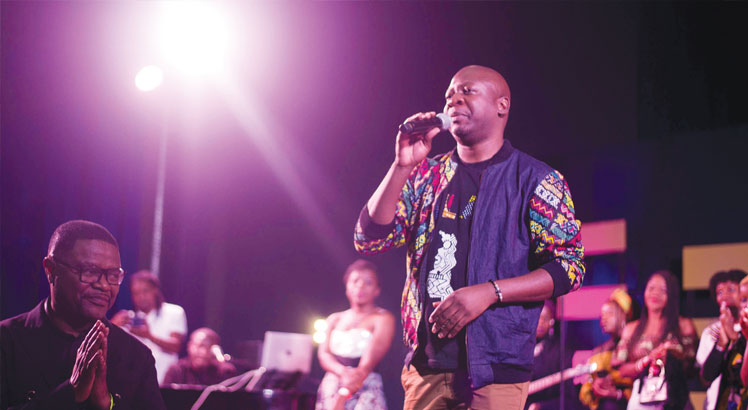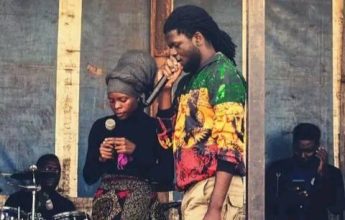Kenny Gilmore Longing for home
Malawi is a country with a deep tradition of song and dance.
A couple of international artists have crafted their names in the history of Malawi music so well that the memoirs of the country’s music will be incomplete without them.
One such man is Kenny Gilmore, best described as a mixed world musician. He has so much under his name, including his escapades with Sangalala Afro Blues Band, a skilfully merged traditional African rhythms and soulful American blues band which created a unique sound from 2004.
Born in 1978 in Kenya’s Rift Valley province, Gilmore was raised in Malawi before moving to New Orleans in 1998. While there, he began playing blues harmonica, winning the Louisiana Rebel State Harmonica championship in 2002.
In 2003, he returned to Malawi and founded the Sangalala Blues Band, which released its debut album Ngati Mafunde in January the following year. Local television and radio stations started playing the upbeat melody and it soon became a number one hit.
Inspired by musical archivist Alan Lomax’s famous journey to collect early blues recordings in the deep American South, for six weeks in 2009 Gilmore and his team travelled to villages across Malawi documenting and recording some of this musical heritage, both past and present.
What Gilmore along with Benjamin Cobb, the director of Promote Africa and ethnomusicologist Waliko Makhala, got was a mix of individual musicians, small groups and cultural dance troupes, some of it purely traditional, some of it more of a fusion of traditional with contemporary and jazz influences.
Interestingly, some fans in Malawi named him Mafunde, the hurricane he melodiously sung about.
Now, Gilmore is back in the limelight, this time wearing a different artistic hat altogether; as an author. He is writing a book that will document his musical journey in different parts of the world, including Malawi.
“You have caught me in the middle of writing a book. I am hiding on the North coast of Morocco, where no one will recognise me. I have been dreaming of writing a book for some time, but I believe that in this life if you have a dream you have to at least try to live that dream. Otherwise, the dream dies, and part of you dies with it.
“The idea, is a collection of short stories about playing the harmonica around the world. Yes, it’s autobiographical. Some of the things that have happened to me while playing the harmonica are so strange, I can scarcely believe them myself—so I feel I need to tell this story. The story celebrates the unique appeal of one of the world’s smallest instruments, and also the varied flavours of the different cultural spheres where I have performed.” he explained in an interview.
Malawi comes into the book a lot as 25 percent of it will be his musical experiences in the country.
“I would say about a quarter of the book is based in Malawi and many of the fascinating experiences that I went through were based in Malawi. For example, I get to talk about playing at Sanjika Palace for the late First Lady Ethel Mutharika, and playing at the first Lake of Stars Festival,” he stated.
Gilmore sees himself as a musical storyteller and his passion and subject knowledge make him a worthy and charismatic presenter. Talking to him is like opening a treasure chest that has been kept a secret for a long time. He has so many stories and such a colourful history and everything he says is like a gem stone.
“I was born in Kenya, went to high school in Malawi, my parents are from England and the USA. I went through high school at Saint Andrews in Nyambadwe. I came back in 2003 and spent four years working as a teacher, and also as an artist.
“I think you could call me a mixed world music musician, my main styles are blues, reggae, US folk, Malawian guitar and more recently, Latin and I play the acoustic guitar, harmonica and sing. I led the Sangalala Afro Blues Band in Malawi. People in Malawi have given me the nickname ‘Mafunde’ for my song, or sometimes Amuna-amuna,” said Gilmore.
Being a musician happened almost by accident, he says.
“At first I was just a dancer, performing for the crowds in New Orleans: I got closer to the stage, and then one day I was on the stage and I had a harmonica in my mouth. I guess I started playing professionally about 17 years ago. Curious? Well you will have to read my book,” he said with a tad of expectancy.
But what was the inspiration behind his one chart hit in Malawi with his group; the Sangalala Band, with whom he toured the country?
“If you listen to the lyrics you will realise it’s about a hurricane. I first wrote the song while a real hurricane was going on, in Louisiana. If you listen a bit harder you will realise it’s also about a girl—many songs are.
“I was in love with an American girl at the tender age of 19, but it turned out to be a bit of a romantic disaster, and it helped to inspire the song. In the song I compare such things to be like a hurricane blowing in your life. If you really want to dig deep into the song it’s also about the positive energy of being alive—most Malawians have plenty of that,” he said.
Gilmore boasts of working with almost all Malawian artists who were active back then.
“I worked with almost everybody who was on the scene at the time. Don’t forget I also made the Deep Roots Malawi documentary, where I travelled around interviewing musicians, DJs, ministry of culture, chiefs and dancers, among others. We were trying to make an introductory movie about Malawian music,” he mused.
Since leaving Malawi, the artist lived in England, Portugal and El Salvador. He has been on a journey studying different kinds of music, most recently Latin music.
“I am going to make an Afro-Latino album at some point. Why all the movement, you might ask? I’ve been trying to figure out, what kind of musician I want to be—it seemed to me that there was a missing piece, somehow. I think I found it in South America. I’m ready to make more albums now. In fact, I have already started. I’ve always been a bit of a musical adventurer.
Last summer, I travelled around the world recording one song in multiple countries, with multiple musicians. The project is called Life River, and I am working on a video to accompany it now, with the same film editor who did Deep Roots Malawi,” he explained.
He also recorded Colour blind, an album released in El Salvador. The album is eclectic, as songs are in different styles, but with a common theme, that is of powerful life experiences and the way that they change people. It also has Malawi links.
“The more popular songs on the album are called Only Time Will Tell and Woman Help Me Light This Fire, but the title track Colour blind is one of the most beautiful recordings I think I have ever made. It’s a bare bones acoustic track, with minimal backing.
“I was listening to a lot of Malawi’s golden brothers the Donald and Daniel Kachamba and their unique guitar sound inspired the track. Another song which links to Malawi is The Hero Is Gone, which is a track which I wrote at first in honour of an amazing Malawian musician called Stonard Lungu who died unexpectedly before I could record him for Deep Roots Malawi. It ended up as a tribute to all fallen musicians, and I used it on the soundtrack for the documentary,” he said.
Almost a decade after leaving Malawi, Gilmore still follows Malawi music religiously.
“I do like to keep an eye on things that are going on in Malawi. I was delighted to see that our interviews with Gaspar Nali from Nkhata Bay, have really helped to get him some international fame. In fact, I can confirm that he is going to work with a German producer to make an electro-remix from one of his songs and that we will be helping to provide promotional footage from our archives. What we need now, is for Malawian music fans to get behind him and help him to go all the way and make a sensational album which can be marketed inside and outside Malawi.
“That was the whole point of Deep Roots Malawi, to throw a spotlight on some Malawian artists. It seems to have taken some time, but the project is finally bearing its fruits. I see that the inestimable Wambali Mkandawire is releasing a new album soon-that’s great! He is a man who understands music in Malawi and also in the international scene. I was really impressed by his passion and authority when we spoke at his house in Mzuzu during the Deep Roots Malawi recordings,” affirmed the artist.
His thoughts about Malawi music are as honest as a mirror; “Malawi has just come through a tough time. No two words about it,” he says.
Adds Gilmore: “But tough times can bring out the best in people, and it can also inspire artists to express what people have been going through. I think that Malawian artists will have a lot of good messages to spread, in the next few years. Where do we need to change?
When I lived in Malawi, I felt like a lot of middle class Malawians never really supported Malawian music. They almost seemed embarrassed to be Malawian, and always dressed, talked and supported imported art from the USA.
“I even met some bright young Malawians who actually pretended that they didn’t speak Chichewa very well, just to appear more western. Don’t get me wrong, I think the USA is great. But unless you can be proud of your own culture, and wear a bit of it on your sleeve—how can you expect the rest of the world to take notice,” he said






Where can we get the book?